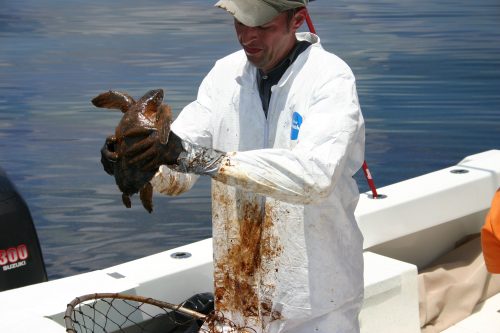
The current environmental pollution has not only damaged the forests and plantation but wildlife as well. If you dig deep into the records, you will realize that a portion of wildlife has vanished into thin air today. Scientists and observers are constantly working on finding the reasons behind such extinction of wildlife. Some evidence has suggested that one reason for such extinction of wildlife, including marine life, is the spilling of oil.
The spilling of oil on the land and in water has led to a negative impact on the overall health of the animals. Apart from affecting the vegetation, continuous oil spills have taken a serious toll on marine life. In this situation, controlling this unwanted and uncalled-for scenario seems to be the only need of the hour.
Many solutions for controlling oil spills have been introduced in the environment, but some of them could pose a threat to it. Emission of gases while handling heavy machinery to treat oil spills makes the situation worse for one and all. It is, therefore, essential to look for more eco-friendly alternatives instead.
Listed below are some eco-friendly methods using which you can clean up oil spills and control the damage done to the environment and wildlife:
Oil Absorbents:
Oil absorbents have gained immense popularity in the present times. This method is effective in controlling oil spills on both land and water. As the name suggests, oil absorbents tend to absorb or soak the oil spilling; hence removing it from the environment. Different types of absorbents are being created by manufacturers like oil removal wipes, oil removal pads, socks, tissues, etc.
You can buy oil absorbents in bulk. They are easy to store and are an eco-friendly alternative to control oil spilling. Some of them are made using biodegradable materials. Explore the online and offline platforms and buy the best one.
Nylon And Human Hair:
Believe it or not, but it is an innovative solution to clean up the spilling of oil to a greater extent. You can pair nylons with human hair and put them at the site of oil spills. Much research and studies have been done on this method, and some of the researchers have claimed it to be effective.
Some studies have also stated that using animal fur instead of human hair can soak a gallon of the oil spill in less than three minutes.
Oil-Munching Mushrooms:
Various oil-munching mushrooms are considered a natural oil absorbent, thereby an effective solution to clean up the spill. This process is termed bioremediation. Under this procedure, an introduced organism absorbs oil quickly from the area and then breaks it down. It results in a quick and effective cleaning of the oil from the environment.
This procedure relies on the idea of colloidal chemistry. The formation of micelles penetrates and then breaks down the long-chain hydrocarbons into smaller units. Upon its occurrence, the resident bacteria then ingest and biodegrade the oil through bioremediation.
Pine Shavings:
Nobody would have ever thought that pine shavings could serve an important use in controlling oil spilling in large factories and industries. Just like the hair and fur, pine shavings happen to be a natural and environment-friendly approach to absorb and soak up oil from the land surface.
However, using this method comes with a drawback. The smell so emitted in this process is awful. It may as well be damaging and may lead to respiratory problems.
Takeaway
Ditch the idea of using heavy machinery and other expensive approaches to clean the oil spillage around you and switch to some eco-friendly methods instead. Apart from the above-listed solutions, beeswax balls and peat moss may also come to your rescue. Lastly, the oil industry has activities that are hazardous to human health, sometimes leading to serious issues like damage to the liver, respiratory system, overall immunity loss, and even reproductive damage.
Interesting Related Article: “Over 700 barrels of crude oil spilled from pipeline in Ventura, California“

